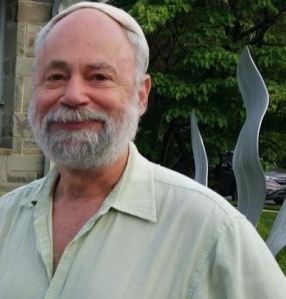I spent last week at URJ Six Points Sci-Tech Academy, where every morning after Modeh Ani, we blow something up. It’s called Boker Big Bang. Check out Friday morning’s explosion here (after the first explosion, skip to 2:30 to find out why the experiment didn’t work the first time)!
As a rabbi, educator, and former camp counselor, I’ve been on a lot of field trips over the last 15+ years. I’ve taken groups to beaches and amusement parks (fun but terrifying in terms of keeping track of kids); gone hiking, camping, and rock climbing (not my favorite); visited museums, synagogues, and historical sites (not the kids’ favorite).

Earth and Sky Workshop simulating volcanic rock formation.
I have never, EVER seen a group as well-behaved as the one I accompanied to Google’s Cambridge offices on this week’s Trip Day with URJ Six Points Sci Tech Academy. The dozen campers filed off the bus and across the street without seeming to notice that there were stores and restaurants lining their path, selling all types of items either forbidden or unavailable at camp. They listened carefully to instructions, showed kavod (respect) to our guide by dutifully following her everywhere, and asked thoughtful questions of a panel of Google employees.
It wasn’t until we were back on the bus that I realized what had happened. It’s not that Sci-Tech campers don’t sometimes struggle to pay attention to instructions. It’s not that they don’t want to binge on candy (they did that later when we stopped at Boston’s Museum of Science). It’s not even that the Google offices are incredible to behold (they are!).
It’s that, for this particular group of kids, there was nothing more exciting to do on a sunny Tuesday morning in July than to learn about how a major technology company operates.

Making s’mores with the Forensic Science Workshop, after a lesson on arson!
This realization filled me with joy. I felt so happy for these kids, that they had found a place tailored to their exact interests, with dozens of like-minded kids for them to connect to. Even within the camp, campers are able to split off into subgroups based on what excites and inspires them: Biology, Earth Science, Robotics, Video Game Design, Web and Graphic Design, Forensic Science, Digital Film, Programming and Coding. While we were touring Google, other workshop groups were scattered across the Boston area, learning about earthquakes, playing with DNA in a crime lab, and meeting video-game designers, among other things.
Though I was never a science kid, I’ve been a fan of Sci-Tech for awhile. I’ve promoted it to Jewish families as an alternative to traditional overnight camp. But Sci-Tech actually provides something that even my own, much appreciated, Jewish camp experience did not. Sci-Tech gives campers an opportunity to nurture their talents and interests in a Jewish context, and connects them with kids who are, in many ways, just like them.
In my camping experience, the only thing that all of us had in common was Judaism. We managed to figure out for ourselves who enjoyed sports and who preferred the arts, but we didn’t really put much energy into either while we were at camp. We just liked being together. The Jewish part of camp ended up becoming one of my major interests, but other passions of mine–writing, music, theater–were usually confined to a few periods a week, or relegated to my life outside of camp.
This is exactly what the Foundation for Jewish Camping was addressing when they began providing incubator grants to camps like Sci-Tech. Noticing that many Jewish families were not opting into Jewish overnight camp, they looked for ways to make the Jewish camp experience more appealing and accessible. Sci-Tech provides the option of two-week sessions (not available at traditional camps past a certain age) in which a camper can be completely immersed in a subject they are passionate about.

In addition to leading Jewish activities, this time I also taught arts and crafts. Here’s the result of a “design challenge” to make a lanyard Torah.
(A side note: I didn’t know specialty camps were a thing until I was an adult. My brothers and I had unwittingly attended a sports-based day camp where my mom worked as a nurse, until we were old enough to go to URJ Camp Harlam. Years later, I worked at a JCC camp that specialized in the visual and performing arts. I came home and said to my mother, accusingly, “Did you know there were camps where they do theater and music and pottery ALL DAY!?!?!”).*
I’m not the only one who realizes how amazing this is for kids who may not have been interested in Jewish camp for the sake of Jewish camp. The campers notice too. Walking with a first-time camper to make s’mores–after a forensic science lesson on arson, of course– I asked her how she liked camp.
“I love it!” She bubbled. “It’s as if they designed this place just for me.”
*By the way, URJ Six Points’ next project is an arts-focused camp. I can’t wait!


